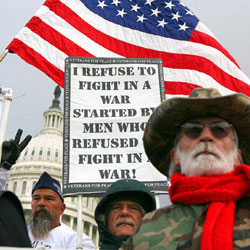This study suggests that people will respond not by outright rebellion but by subverting the system or doing what they can to manipulate it for their own benefit.
The experiment was carried out at a university back in the 1960’s. It was designed to discover what happens to people who are in prison and what happens to their guards. The results were amazing.
Here’s a synopsis of the experiment:
I. The student volunteers were interviewed and determined to be your run-of-the-mill undergrads who were just going to school and minding their own business. They were in no way unusual.
After their personality profiles were taken, they were sent home and told they would be contacted if needed for a study then being designed. Several weeks passed before anything else happened giving the students time to forget the fact that they had signed up for the experiment.
II. The students were randomly assigned to become ‘prisoners’ and ‘guards’.
III. ‘Guards’ were notified to come to the school the day before Spring Break began. They were issued reflective sun-glasses and arm bands and told to report for duty that night.
IV. The ‘prisoners’ were woken from sleep in their homes in the middle of the night and taken to a makeshift ‘prison’ in the basement of a school building. They were given very little if any information but were simply issued identical nightshirts, footies and hairnets.
V. The ‘prisoners’ were fed regularly [though the food was not particularly appetizing], allowed to use the bathroom as needed, given places to sleep, etc.
The ‘guards’ were told to maintain a formal distance from the ‘prisoners’ but were otherwise given no instructions.
VI. Once the shock experienced by the ‘prisoners’ wore off, they began joking among themselves and attempted to include the ‘guards’ in their banter.
Following the instructions they’d been given, the ‘guards’ maintained their distance.
VII. Slowly the two groups polarized. The ‘guards’, who experienced some anonymity behind their sunglasses, became harsher toward the ‘prisoners’ and began taunting them.
The ‘prisoners’ became beligerent toward the ‘guards’. Bit by bit, members of both groups began perceiving the other group as being somehow less virtuous than their own. It became acceptable to treat the 'other' in more and more negative ways.
VIII. As tensions escalated, the prisoners threw food at the guards and the ‘guards’ turned the school’s fire extinguishers on the ‘prisoners’.
IX. On about the 3rd or 4th day, the ‘prisoners’ began planning a prison-break. Word leaked out and a ‘guard’ reported the development to the professor who had designed the study.
X. At this point, even the top of the pyramid collapsed. The professor, who had designed the study had assigned himself the role of ‘warden’. He had envisioned himself as the dispassionate observer and as simply answering questions brought to him by the students. Instead, he became overinvolved:
A colleague dropped by to discuss the variables in his study and received a shock. He was met with the statement, ‘Variables be damned! We’ve got a prison-break being hatched down there! We’ve got to stop it!’
The experiment was ended several days before it was scheduled to be completed. Neither the professor nor the 'guards' were interested in the termination of the study but the Dean ordered its closure and that was that.
After it was over, all participants were sent to the school’s counseling department to help them recover from the aftereffects of their experiences.
This study was undertaken to determine how people who are given absolute power over others are affected and how those who are subjugated respond. All parties got more than they bargained for.
*_*_*
This dynamic occurred within three or four days after an experiment began that involved people who started out perceiving themselves as equals.
How much more terrible it becomes in the prison system generally and, to an even greater degree, in Guantanamo Bay where the individuals involved do not enter the situation recognizing their similarities but focusing only on their differences.
Subscribe to:
Post Comments (Atom)

































3 comments:
While there is rampant abuse in the prison system, Gitmo would have to be exponentially worse, because there, they do not even to maintain a facade of respect for human rights.
and, again, they focus on the difference between guards and prisoners. and, each group sees the 'others' as beneath themselves.
this is always a recipe for disaster.
Agreed
Post a Comment